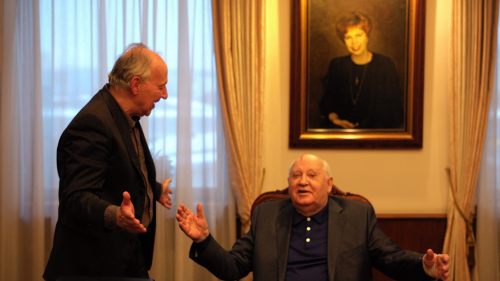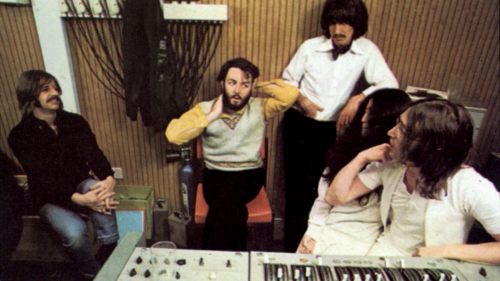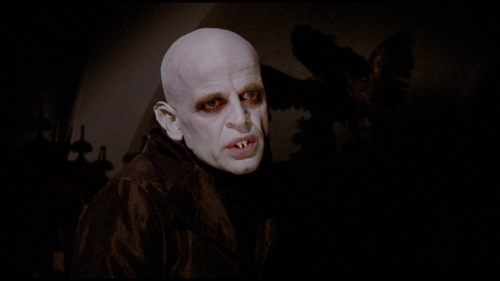LESSONS OF DARKNESS: Herzog’s Alien Earth
We're incredibly excited to partner with Fandor, a streaming service with the biggest handpicked collection of the most-talked-about indie films from around the world. With a catalogue this diverse and provocative, it was both easy and very, very hard to choose a handful of titles to discuss here on BMD.
Werner Herzog is known for telling stories of people at the extremes of life. Whether conquistadors, vampires, or grizzly men, there’s always an element of desperation to his subjects. But what about when he covers a subject that can’t be represented by an individual - or even multiple individuals? In such circumstances, such as post-Gulf War doc Lessons of Darkness, Herzog transforms the very Earth itself into a character - a living being, unmoving but still imbued with emotion and power.
Herzog presents Lessons of Darkness as a documentary not necessarily from Earth, but from “a planet in our solar system,” shooting postwar Kuwaiti landscapes and architecture as strange and inhuman. His aerial cameras swoop over sand, buildings, and burning oil wells with a detached lack of emotion. We observe this alien world from above, musing upon the destruction its population has wrought.
Herzog isn’t interested in the politics behind the Gulf War, or even the war itself - the area and event aren’t even mentioned. The film is a pseudo-fictionalised account of the aftermath and cleanup, arranged to fit Herzog’s own narrative. His sonorous voiceover indicates as much: “the war lasted only a few hours; afterwards, everything was different.” Everything here is detached from actual events, presented solely as bizarre spectacle. The title cards lay out the fictitious narrative (and read like the tracklisting to a great lost Manic Street Preachers album from the ‘90s):
- A Capital City
- The War
- After the Battle
- Finds From Torture Chambers
- Satan's National Park
- Childhood
- And a Smoke Arose Like a Smoke From a Furnace
- A Pilgrimage
- Dinosaurs on the Go
- Protuberances
- The Drying Up of the Source
- Life Without the Fire
- I am so tired of sighing; Lord, let it be night
The most iconic and striking sequences in Lessons in Darkness involve the oil fires spewing from the surface. It’s imagery that feels cinematic and constructed - it’s gotta be special effects, right? - yet we have to accept that it's real life. Workers - described as “creatures” by Herzog - attempt to put out the fires with enormous water cannons, like they’re trying to extinguish the flames of Hell itself. This is where Lessons in Darkness feels most like dystopian science fiction: faceless figures clad in protective armour, atop great hydraulic beasts, attacking endless plumes of flame amidst a post-apocalyptic nightmare. When they eventually succeed in dousing the fires, it becomes even more Gilliamesque: they reignite the fires immediately, Herzog intoning, “has life without fire become unbearable for them?"
There’s barely any diagetic sound in Lessons of Darkness. Only a couple interviews make it into the film, like footnotes to the grandness around them, standing out purely for their isolation. The operatic score soars in perfect concert with the imagery, telling the story as much as any other production element. Psychologically, it’s overwhelming - watch it with the volume up and prepare to be blasted back into your seat.
And then, of course, there’s Herzog’s narration - one of his most poetically succinct. Herzog’s deeply philosophical, often pessimistic way with words has become a subject of parody by now, but Lessons of Darkness reminds just how powerful it can be when deployed well. Herzog holds back for most of the film, only piping up now and again to deliver a literary quote or ask rhetorical questions about the goings-on.
The film received criticism for viewing war from a purely aesthetic perspective, without comment or critique, but it could be countered that presenting these events as alien is itself a critique. Its conscious abstraction makes us reassess the devastation through the science-fiction lens Herzog uses. If the film focused more on soldiers or people, we’d see war the same way we always have. But we’re forced to accept this Mad Max apocalypse comes from human influence. By removing context and “penetrating deeper than CNN ever could,” in Herzog’s words, the act of war seems all the more bizarre and unthinkable.
Lessons of Darkness is barely an hour long, but boy, it's a great hour. It's a hypnotic, almost religious watch - a service held in Hell, officiated by Herzog and accompanied by the world’s loudest orchestra. Not just one of the strangest documentaries around, it’s also one of the best. Living up to its opening quote about the end of the universe, Lessons of Darkness is a glimpse at a world-death caused by humanity - one we haven’t entirely avoided yet.
Fandor makes it easy for you to find the right film to watch. With the biggest handpicked collection of the most-talked-about indie films from around the world, there’s always something great to watch, whatever your mood, on almost any device.



